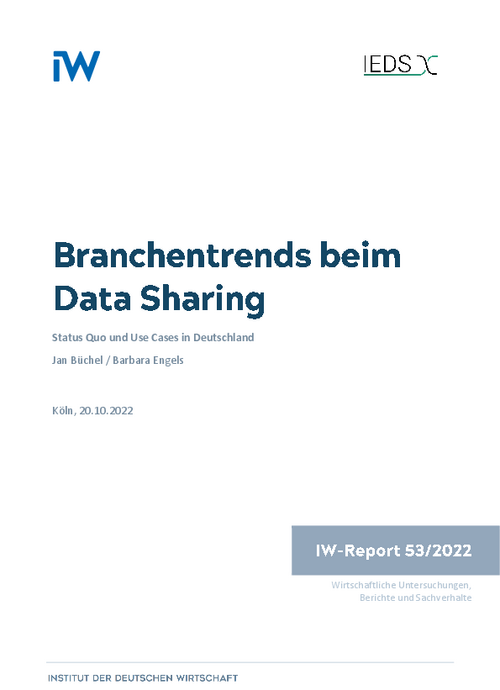Data is generated everywhere along the value chain. Each player produces data specifically or as a by-product at various points in the production process. This data can offer significant benefits for the companies themselves and for the economy as a whole.

Industry trends in data sharing: Status Quo and Use Cases in Germany
A publication from the project IEDS - Incentives and Economics of Data Sharing on behalf of the Bundesministerium für Bildung und Forschung (BMBF)

Data is generated everywhere along the value chain. Each player produces data specifically or as a by-product at various points in the production process. This data can offer significant benefits for the companies themselves and for the economy as a whole.
Therefore, it is important for every company to be able to store data digitally, manage it efficiently and use it. Then the company is data economy ready. Companies that are data economy ready can operate data sharing particularly efficiently. Data sharing means that a company receives and processes data from external sources, i.e., from other companies. Data sharing also occurs when a company passes on its data to other companies, which then process the data.
Data sharing can have many advantages for companies. When production data is shared between different players in the value chain, supply chains become transparent. If bottlenecks occur at upstream stages of the value chain, players at downstream stages are informed about them, at best in real time, and can respond in an automated manner.
Currently, only a few companies in Germany are data economy ready (29 percent) and only a few companies operate data sharing (27 percent). This is shown by this study, which evaluates the results of a survey of 1,002 companies from the industry and industry-related services sectors conducted in the fall of 2021.
The focus of this study is on the considerable differences between the industries. While 47 percent of companies in the information and communications technology sector are data economy ready, the figure for transport and logistics is only 13 percent. While 47 percent of business-related service providers practice data sharing, only 14 percent of “other manufacturing” companies do. These differences are also based on the fact that the products and business models, and thus the potential for data-based value creation, differ between the sectors.
Across all industries, companies perceive numerous barriers to data sharing. It is not clear to many companies how they can derive benefits from data sharing and how their business model fits in with data sharing. The use cases of the Gaia-X data infrastructure initiative can provide orientation. However, these have a strong focus on the healthcare sector. If it were possible to promote use cases for more areas of application and to place a focus on industrial sectors, more companies could feel addressed by them. It would then be probable that the proportion of companies engaged in data sharing increases across all industries.

Industry trends in data sharing: Status Quo and Use Cases in Germany
A publication from the project IEDS - Incentives and Economics of Data Sharing on behalf of the Bundesministerium für Bildung und Forschung (BMBF)

More on the topic
Theories of Harm Because of Data
While digital platforms become more and more important for the whole society as well as the economy, regulatory reactions are also discussed and implemented.
IW
KI and the Labor Market: An Analysis of Employment Effects
It has been about ten years since Frey and Osborne's study on the automation risks of occupations in the USA fuelled the debate on the end of work due to digitalisation worldwide. Since then, numerous scientific studies have been published to examine the ...
IW